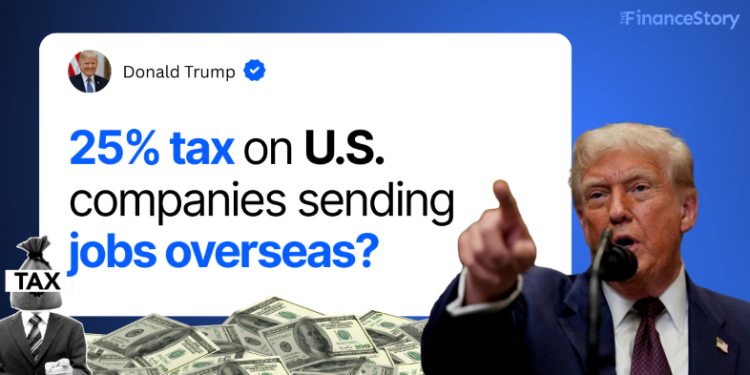- A new storm is brewing in Washington, and this time it directly targets India’s crown jewel — outsourcing.
- US Senator Bernie Moreno’s HIRE Act proposes a 25% tax on outsourcing payments and bans tax deductions for US firms using offshore providers.
- But the bigger disruptor isn’t politics, it’s AI, already automating work once sent offshore.
What the HIRE Act Proposes
The HIRE Act stands for Halting International Relocation of Employment Act.
It proposes:
- 25% Outsourcing Tax: Applied on US payments to foreign service providers.
- No Tax Deductions allowed for these payments.
- Fund US Jobs: Revenue from the tax would go toward domestic apprenticeships and workforce training.
Moreno told Fox News Digital, “While college grads in America struggle to find work, globalist politicians and C-Suite executives have spent decades shipping good-paying jobs overseas in pursuit of slave wages and immense profits – those days are over.”
Why India should worry?
For decades, India has been the world’s outsourcing hub, powering everything from Silicon Valley’s IT backbone to Wall Street’s finance operations.
The US is by far its biggest client.
In FY25 alone, the Indian IT and business process management (BPM) sector generated $225 billion. And over 50% of this income? Derived from U.S. clients.
| Company | Period | Revenue from North America | Share of Total Revenue | Key Highlight |
| TCS | FY25 | $14.8B | 50% | Biggest market |
| Q1 FY26 | $3.67B | Slight dip | Growth pressure visible | |
| Infosys | FY25 | $11.17B | 57.9% | Highest dependency on North America |
| HCLTech | FY25 | Americas grew 5.3% CC) | Total rev $13.8B | Americas = fastest growing region |
| Tech Mahindra | Q1 FY26 | $766M | 49% | Americas = nearly half of revenue |
But IT is just one part of the story
GCCs: India’s GCCs (over 1,700 as of 2025) make up a huge chunk of India’s total GDP.
In FY2024, they generated approximately $64.6 billion in revenue, employing over 1.9 million professionals across various sectors, including technology, finance, and engineering.
Finance & Accounting Outsourcing: When talking about outsourcing, you cannot ignore one of the most prominent sectors: accounting and finance.
In 2024, India’s finance and accounting business process outsourcing (F&A BPO) market generated approximately $2.6 billion in revenue, as per Grand View Research.
Freelancers: A rising slice of the outsourcing economy.
Not America’s first attempt
This isn’t the first time Washington has tried to play hardball with outsourcing.
2004 “Offshoring Ban” Attempt
In 2004, several US states attempted to block offshoring of government IT contracts, again with little impact.
Obama Era: Outsourcing Rhetoric (2009–2012)
Back in 2009, President Obama frequently criticised the trend of sending jobs abroad and pushed for bills like the Bring Jobs Home Act. Outcome: Failed to pass through both houses and become law.
Trump’s “Hire American” Executive Order (2017)
Didn’t directly tax outsourcing but tightened H-1B visas, making it harder for Indian IT firms to send staff onsite.
This was effectively a barrier to the traditional “offshore + onsite” outsourcing model.
Outcome: Slowed down visa approvals, raised costs for Infosys, TCS, Wipro, etc. But outsourcing itself continued.
However…
Past efforts were more about tax incentives/penalties or visa rules, not a flat outsourcing tax.
If this Bill becomes law
For US companies:
- The U.S. doesn’t have enough skilled tech talent to do all this work at home. That’s exactly why companies outsource to India — for both cost and scale.
- So even if the bill passes, American firms might still need Indian talent. They will just pay more for it.
For Indian firms:
- Margins could shrink as they cut prices to retain US clients.
- Hiring may slow, especially for routine roles.
- Heavy dependence on the US market becomes a glaring risk.
As Rohit Jain of Singhania & Co told TOI: “New contracts could dry up, margins will shrink, and firms will scramble to expand beyond the US.”
But the Real Disruption isn’t Political…It’s AI
One force is already reshaping outsourcing: Artificial Intelligence.
Tasks that were once offshored, such as coding, data entry, support, and back-office operations, are being automated. AI doesn’t just make work cheaper; it makes some of it unnecessary.
If Indian firms keep competing on labour arbitrage, they’ll be blindsided. The future winners will be those who:
- Move up the value chain,
- Embed AI into their offerings,
- And deliver innovation, not just cost savings.
Wrapping up…
The HIRE Act still faces hurdles — House, Senate, and Presidential approval.
So far, neither Republicans nor Democrats have supported Moreno’s proposal.
The bill is vague (what exactly counts as outsourcing?
Big Tech (Google, Microsoft, Amazon) won’t back it they’ve invested billions into India’s GCCs. Their CXOs’ influence in Washington (remember the Sept 4 gala dinner with the President).
For Indian accounting firms, finance BPO providers, and CFOs running GCCs, the lessons are urgent:
-
Diversify beyond the US: The Middle East, UK, and Australia are already becoming new outsourcing hubs.
-
Move up the value chain: Compliance and tax prep will face the biggest squeeze; advisory and tech-enabled services will hold stronger margins.
-
Embed AI into delivery: Competing on cost alone is no longer sustainable — automation is changing the rules faster than politics.
FAQs
What is the US HIRE Act, and why is it a threat to India’s IT and outsourcing industry?
The HIRE Act (Halting International Relocation of Employment Act) proposes a 25% tax on payments made by US companies to foreign service providers, including Indian IT and accounting firms.
It aims to discourage outsourcing by making offshore services significantly more expensive, threatening India’s $250 billion IT and outsourcing industry, which relies heavily on the US market.
Why is the HIRE Act being pushed?
Since his first term, Trump has promoted the “Buy American, Hire American” agenda.
The HIRE Act is a reflection of growing protectionist and populist sentiment, targeting foreign outsourcing as a cause of job loss in the US. It’s designed to penalise US companies that send jobs abroad, encouraging them to keep employment domestic instead.
How could Indian Global Capability Centres (GCCs) be impacted by the HIRE Act?
Indian GCCs, which function as tech and operations hubs for many Fortune 500 US companies, could face higher costs and regulatory hurdles if the HIRE Act becomes law.
The proposed tax and loss of deductibility would make operating GCCs less financially attractive, potentially slowing growth, increasing local hiring pressure, and pushing companies to rethink their global service delivery models.














